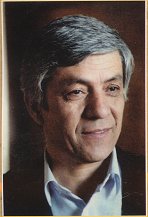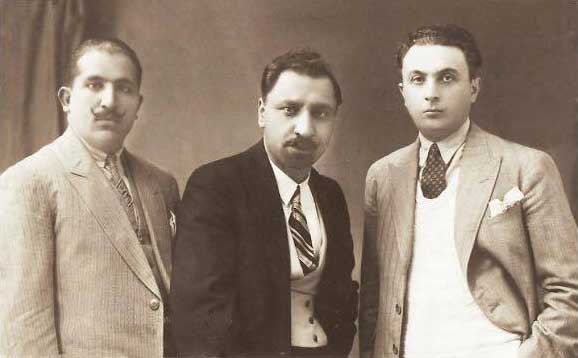Taufiq Wahby (1891-1984)
Taufiq Wahby (1891-1984)

Mr. Taufiq Wahby (Kurdish: Tewfíq Wehbí, تهوفیق وههبی), was born in 1891 in Cuwar Ta village of Silemaní district in Baban province/Kurdistan. Wehby was the champion of the codification of the central dialect of Kurdish language in 1920’s. He was the Kurdish philologist and army officer. Colonel Tofiq Wahby served as a colonel of the army in the Ottoman Empire. After the fall of the Ottoman Empire and creation of the new state of Iraq under British supervision, Wahby become an influential member of the new Iraqi army. His scientific and highly remarkable efforts were met with refusal when confronted with the Arab rule nationalistically oriented Iraqi Ministry of Culture. The reason given was that no ‘foreign accents’ or Kurdish “caps” could be placed on the ‘holy Arabic letters’, the letters in which the Qur’an (Koran) is written.
It is worth mentioning that the so-called Arabic letters originally were neither Arabic nor Islamic. They already existed in pre-Islamic times, and were derived from the Old Aramaic script, i.e. from the ancient language of the Jews. Despite of the fact that the Kurdish press, and the schoolbooks which were printed for Kurdish primary schools by the Iraqi government could not employ this alphabet until the end of the 1950’s, this alphabet, which was modernised and adapted for the Kurdish language, was nevertheless known amongst the Kurds.
There was something else the abovementioned Wahby at his time heal endeavored to do. It was in the early 1920’s when he enlisted the Latin alphabet for the use of Kurdish in a form that leaned heavily an English linguistic usage. His efforts then were also unsuccessful, because the Iraqi government, using Islamic religious arguments likewise forbade the dissemination of a “European-Christian” script in Muslim Iraq. ln connection with this, it should be pointed out that Wahby held eight ministerial posts in the Iraqi government. It should be noted that Wahby’s Latin alphabet, like that of J. Bedir Khan (whose alphabet relied less on English linguistic use than on that of the French and Turkish alphabets), displayed several flaws. Had these two scholars collaborated, the Kurdish people today would in all probability have a better Latin alphabet.
Regarding to this J. Bedir Khan reply to a reader’s enquires about unification of Kurdish alphabet and cooperation with T. Wahby in HAWAR issues 9, 30 Sep 1932 –the first Kurdish paper written in adapted Latin (French and Turkish) based alphabet by J. Bedir Khan in French Syria– that
“Yes, we are aware that the distinguished linguist, dear Tewfiq Wehbi Bey has also codified an alphabet based on Latin characters. We met once in Damascus, introduced our proposed alphabets to each other and compared them together. There were some differences in them. We both were interested in unifying and publishing our alphabets as one version but at the time my dear beloved brother indicated his alphabet was not ready yet and some more work was needed to complete it. Therefore the unification of both alphabets was delayed.
Tewfiq Wehbi Bey then returned to Iraq where, as you all know, unpleasant events took place. In spite of all difficulties I sent him several letters, but I did not hear from him. Later I realized that my letters have not reached him. Indeed the publication of Hawar was delayed for this reason. Hawar came out in May but I have had permission to publish since 26 October 1931 and was ready for the publication of the first issue by February. On four occasions I waited so the dear brother (T. Wehbi) and I could together introduce such a version of alphabet that would prevent any future disagreements. As I said above I did not get any response. I could not wait any longer. “
T. Wahbi was a gifted linguist personality who promoted the Kurdish language and culture. T. Wahby continued his linguistic ambitions in many years to come and he published several books and article in this line. Some of his best known publications are the Kurdish Grammar (Baghdad 1929) and the Kurdish-English Dictionary (Oxford press 1966) which he co-published with C.J. Edmonds.
T. Wahbi held several government posts, including director-general of irrigation and director of land survey (1942). He was appointed minister of the economy in 1944. He later become become a member of the Iraqi Senate. At the time of the Iraqi revolution of 1958 Wahbi was in the UK and remained in London until his death in 1982. He was an active member of Baghdad PEN Club. T. Whabi will always remembered among the first pioneers of Kurdish codification and orthography. Wahby died in 1984 at age of 93.

Tewfíq Wehbí
Publications
- 1925 – “Kurdiyekeman be con hirúfék ú con binúsín?” (In what character and how should we write our Kurdish?), Diyarí Kurdistan, No. 5, pp. 5-6, No. 6, pp. 5-6.
- 1929 – “Destúrí Zimaní Kurdí”(Grammar of the Kurdish language). Baghdad: Dar al-Tiba’a al-Haditha.
- 1933 – “Xiwéndewariy Baw”, Baghdad: Dar al-Tiba’a al-Haditha.
- 1965 – “The origins of the Kurds and their language,” Kurdistan (KSSE), No. IX and X, July, pp. 23-28.
- 1966 – “A Kurdish-English dictionary”, [T. Wahby and Cecil John Edmonds], Oxford Press
- 1973 – “Esllí píte qalibí “e”:y ú shéwey Silémaní” (Origins of the inflectional “e” in Sulaymani dialect), GKZK (Govarí Korrí Zanyarí Kurd), 1973, Vol. 1, Part I, pp. 9-34.
- 1973 – “Haul Maqal ‘Mas’uliyya al-Adib al-Kurdi al-Kubra’ lil-Ustad ‘Abd al-Majid Lutfi ” (On the article “The Great Responsibility of the Kurdish Literary Men” by Professor Abd al-Majid Lufti), Reprinted from al-Ta’akhi, No. 1278, (Baghdad: al-Ta’akhi Press), 15 pp.
This biography is prepared by Dr Dilan Roshani
References
- Hawar, Kurdish magazine published in Damascus, Syria, 1932-35 and 1941-43


